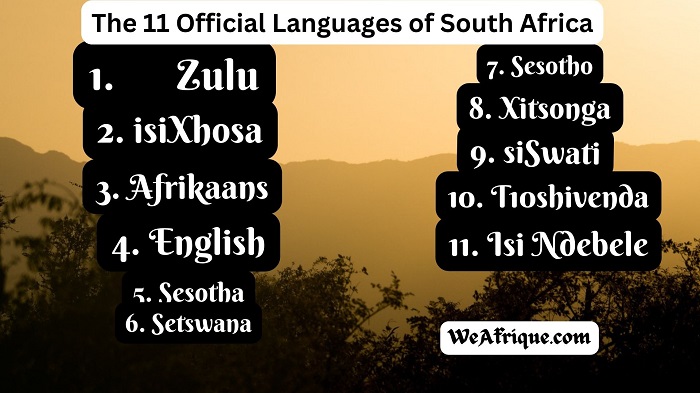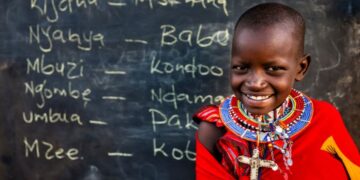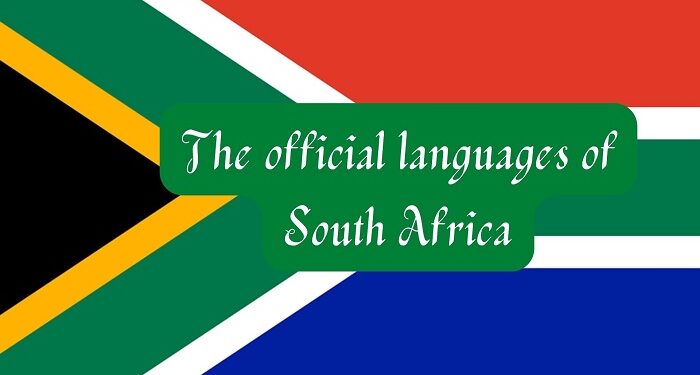The official languages of South Africa are 11 – Sepedi, Sesotho, Setswana, siSwati, Tshivenda, Xitsonga, Afrikaans, English, isiNdebele, isiXhosa, and isiZulu. Among them, the major 3 are isiZulu with more than 22% speakers, isiXhosa with about 16% of South African speakers ad Afrikaans with more than 13% of speakers in the county’s population.
With this number of official languages, the country is one of the world’s countries to have highest number of official languages after Zimbabwe with 16 languages.
Here’s every detail to know about the official languages of South Africa, the number of speakers, the provinces they are spoken in, and some important words and phrases to know.
All the Official Languages of South Africa
1. Zulu
This is the most spoken language in South Africa with about 46% of its total population speaking it. Nonetheless, Zulu has about 23% of South Africans speaking it as a first language.
The language which became the official language of the country in 1994 is the second largest Bantu language after Swahili and it falls under the Niger-Congo language family.
While isiZulu stands as a language, it has dialects such as KwaZulu Natal Zulu, Transvaal Zulu, Qwabe, and Cele.
Some famous words and phrases of the Zulu Language Everyone Should Know
- Ngiyabonga – thank you
- Unjani – how are you?
- Ngiyaphila – I am fine
- Sawubona – Hello (to one person)
- Sanibonani – hello (more than one person)
- Ngiyakuthanda – I love you
- Ulale Kale – goodnight (to one person)
- Yebo – yes
- Cha – No
2. IsiXhosa
18% of the total population of South Africa speak IsiXhosa and the native speakers are called Xhosas. There are about 8.1 million native speakers and about 11 million people speaking it as a second language.
While the language stands on its own, it is closely related to Zulu, Swati, Southern Ndebele, Hlubi, and Nothern Ndebele. It has dialects such as Mpondo (Pondo), Xesibe, Bomwana, Gaika, Gcaleka, Thembu, and Mpondomise.
The language falls under the Bantu language family as many other famous languages in the country.
Some of the popular Words and Phrases in Xhosa You Should Know
- Enkosi – Thank you
- Molo – Hello (to one person)
- Mholweni – hello (2 or more people)
- Mholo ngalentsasa – good morning
- Nceda – help
- Hamba Kakhule or Saka Kakuhle – goodbye
- ndiyakuthanda – I love you
3. Afrikaans
One of the official languages of South Africa, Afrikaans is a West Germanic language that evolved from the Dutch Cape County and is currently spoken in South Africa with a mix of Khoisan languages.
There are about 7.2 million native speakers that take up about 13.5% of the general population.
While the country is mostly populated by Black South Africans, there are only about 600,000 black native speakers while the most speaker is White South Africans with about 2.7 million.
Important Words and phrases in Afrikaans
- Pragtige – Beautiful
- Ek het jou life – I love you
- Goeie More – good morning
- Dankie – Thank you
- Haai or Hallo – Hello
- Baai, Koebaaim ad Totsiens vir nou – bye, goodbye
4. English
As in the case of Afrikaans, the English language was also brought to South Africa by White people. Nonetheless, the country adopted what is called South African English which is known for a slight difference in its morphology, phonemes, accents, and other linguistic classifications.
Although is a dominant official language and is known as a neutral language as it is adopted in the media, schools, and government, it is still regarded as a minority language since it has only 9.6% of the total population.
Some Common Words and phrases in SAE to know
- Braai – barbecue
- Veld – open field
- Dorp – village
- Bonsella – tip, bonus
- indaba – discussion

5. Sesotho sa Leboa
It is a northeastern South African language of people that belong to the Pedi ethnicity. In the 1990s, it was pronounced as an official language and currently has about 9% of the total language speakers of the country.
Despite the fact that the native speakers may have grown over the years, a 2011 census has shown that 4.6 million people are native to Sepedi while 9.1 million people adopt it as a second language.
Going deeper into its language family classification, Sepedi falls under the NIger-Congo family of languages and traces its way to Bantu, and further goes down to Sotho-Tswana.
Some popular Sepedi words and phrases to know
- Ke a laboga ke a leboga kudu – thank you
- Ke go hlolosetše – I miss you
- O fole ka pela! – get well soon
- Ke a rata – I love you
- O Kae – How are you (1 person)
- Le Kae – How are you (2 people or more)
- Dumêlang Mmorong – Good morning
See Also: Most Expensive House In South Africa; See The 10 Costliest Homes And Their Owners
6. Setswana
One of the 11 official languages of South Africa, Setswana is spoken by about 8% of the total population of the country over 4 million people. The language is closely related to Sesotho and Sesotho sa Leboa.
Despite its popularity in South Africa, it has more speakers in Botswana and it is also regarded as an official language. Zimbabwe is one other country where the language is official while it is seen as a minority language in Namibia.
Common words and phrases in Tswana
- Ke a leboga – Thank you
- Ke a go rata – I love you
- O tsongile jang – how are you?
- Ke tsongile sentle – I’m okay (I’m well)
- Ko gae ke kae? – Where are you from?
- Ke tia go bôna kamoso – see you tomorrow
7. Sesotho
The language is famous for being an official language in South Africa and it is a language under the Bantu languages.
It is also popular as the official language in Lesotho and one of the official languages in Zimbabwe.
In South Africa, it boasts of over 3.8 million 1st language users and 7.9 million second language users making up a total of 11.8 million speakers.
Common words and phrases in Sesotho
- Kea leboha – thank you
- Lerato la ka – my love
- Kea u rata – I love you
- U phela joang – how are you
- Ke u hopotse – I miss you
- Tsitwe – December
8. Xitsonga
The Bantu language is closely related to the Tswa-Ronga group. It was made an official language in South Africa in 1996 and is also an official language in Zimbabwe under the name Shangani.
It is used in schools, on radio broadcasts, and in several other official settings and has speakers that count up to 2.2 million people which equates to 4.5% of the total population of South Africa.
Some words and phrases
- Ndzi pfuneni – help
- Xewani – good morning, good day
- Selani Kahle – goodbye
- Kunjhani – how are you? (singular)
- Minjhani – how are you? (plural)
- Ndzi pfukile – I am fine
- Ndzaku khumbula Ndazaku Tsunduka – I miss you
- Ndza ku rhandza – I love you
9. siSwati
Swazi language has above a million speakers in South Africa and is mostly found in Mpumalanga and is also taught in many schools.
The language is one of the Zunda languages and it is closely related to Zulu, Southern Ndebele, Northern Ndebele, and Xhosa.
Some Swazi words and phrases
- Wemukelekile – welcome (singular)
- Nemukelekile – welcome (plural)
- Sawubona – hello
- Máke – mother
- Umuhle – You look beautiful
10. Tshivenda
Popularly known as Venda, Tshivenda is one of the 11 official languages of South Africa, and it is mostly spoken in the northern part of South Africa’s Limpopo province, and among a number of Lemba people.
The language has no fewer than 800,000 speakers within the country and takes up about 2.2% of the entire population.
Some
- Ndi a ni funa – I love you
- Ndo livhuwa – Thank you
- Duvha la mabebo lavhudi – happy birthday
- Mu-ngana-wanga – my friend
- Mudededzi – teacher
- Dzina langa di… – my name is
- Zwiliwa – food
- Madi – water
11. isiNdebele
Southern Ndebele is a Bantu language spoken by 1.1 million South African native speakers and 1.4 people who adopted it as a second language. The language has 2 main dialects, Northern Transvaal Ndebele (Nrebele) and Southern Transvaal Ndebele.
Some words and phrases in isiNdibele
- Livukile – good morning
- Lilale Kuhle – good night
- Ngiyakuthanda – I love you
- Ngiyakukhumbula – I miss you
- Uxolo – sorry
- Ngiyabonga – thank you
- Ngiyacela – Please
- Nceba – Help
The 11 official languages of South Africa make the country a multilingual nation with some of the most official languages in the world. This breeds the advantage of facilitating communication between cultures as well as helping the native languages of the country not go into extinction. Perhaps, the many official languages of South Africa have aided the country to enjoy languages that have existed since the 1500s.





















Discussion about this post